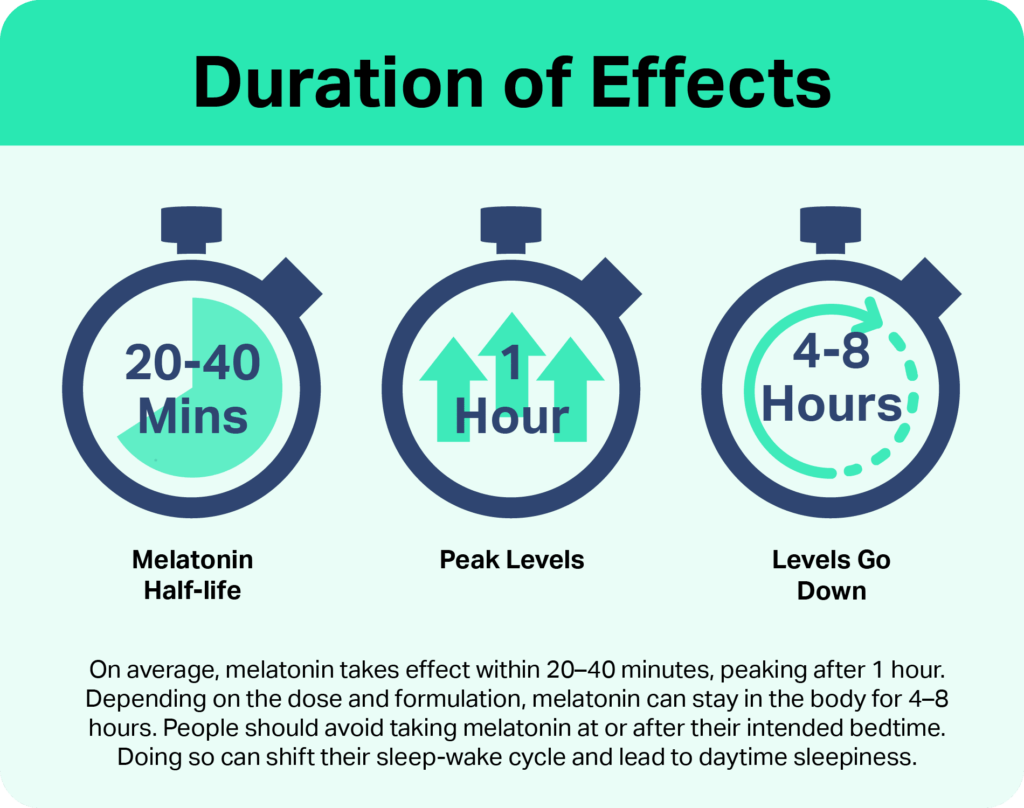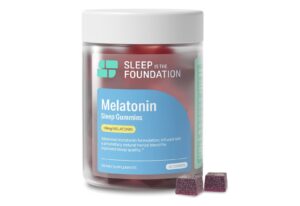When you buy through our links, we may earn a commission. Products or services may be offered by an affiliated entity. Learn more.
Melatonin Side Effects
- Melatonin side effects are typically rare and mild but can include daytime sleepiness, headache, nausea, and dizziness.
- More research is needed to understand the effects of long-term melatonin use.
- Talk to your doctor before taking melatonin during pregnancy or while breastfeeding.
- People with medical conditions like those on dialysis or experiencing depression should also consult their doctor about melatonin safety.
Melatonin supplements are widely available and commonly used as a sleep aid. In the last two decades, melatonin usage has increased consistently among adults in the United States. As with any supplement or medication, safety is a top priority. Before taking melatonin, it is important to understand the possible side effects and potential interactions with other drugs.
Potential Melatonin Side Effects
Adverse effects of melatonin tend to occur with higher doses or with supplements designed to provide extended release of melatonin. Melatonin can also remain active in the body for longer periods of time in older adults. This means that melatonin may be more likely to cause sleepiness the next day when it is taken by older people.
In adults, adverse reactions to melatonin tend to be relatively rare and mild, but there are some common side effects. It is important to discuss these side effects with a doctor, and discontinue use of melatonin if they persist.
- Headache: One of the most commonly reported side effects of melatonin use is headache.
- Daytime sleepiness: The sleep-promoting effects of melatonin can continue into the daytime, resulting in daytime tiredness.
- Dizziness: Dizziness is a possible side effect of melatonin. It is important to avoid the use of alcohol when taking melatonin supplements.
- Nausea: Nausea can occur when taking supplements, but may be due to other factors. If you experience nausea, discuss the timing of your supplements and meals with a doctor.
- Vivid dreams or nightmares: People who use melatonin often report vivid dreams or nightmares.
- Stomach cramps: Some studies have found that stomach cramps or discomfort can occur with melatonin use.
- Mood changes: Mood changes associated with taking melatonin include brief bouts of depression and irritability.
Much of the research has focused on the effects of taking melatonin for only a short period of time. Further research is needed, but the available evidence suggests that melatonin is generally safe for adults when used for up to three months.
Melatonin Side Effects in Children
The safety of melatonin use in children has not been fully determined. More studies are required to better understand its short- and long-term effects in young people. In the limited research to date, the potential short-term side effects of melatonin in children may include:
- Headache
- Dizziness
- Drowsiness
- Agitation
- Increased nighttime urination or bedwetting
The long-term effects of melatonin in children are less clear. Some researchers have concerns that melatonin could disrupt normal hormone levels and interfere with puberty, though further research is needed.
Parents and caregivers should consult with their child’s pediatrician to better understand the potential risks of melatonin supplements. While melatonin may help with certain sleep disorders, medical professionals do not recommend melatonin as a general sleep aid for children or adolescents.
There is evidence that melatonin can be helpful for children experiencing insomnia or a delayed circadian rhythm. But parents and caregivers should avoid using melatonin to induce sleep in otherwise healthy kids or teenagers. Experts suggest starting with lifestyle and behavioral changes prior to trying melatonin.
Is Melatonin Safe?
Melatonin is generally considered to be safe for short-term use in adults, but there may be safety concerns for people with certain preexisting conditions or those taking specific medications.
Melatonin is not right for everyone, and certain people should be cautious and speak with a doctor before taking melatonin supplements.
- People on dialysis or with liver problems: People with reduced kidney or liver function may not be able to metabolize melatonin and have a higher risk of adverse side effects.
- Those who are pregnant or breastfeeding: There is not enough evidence to guarantee the safety of melatonin use in people who are pregnant, breastfeeding, or trying to conceive.
- Older adults with dementia: Older people with dementia should avoid taking melatonin . For these individuals, the potential safety risks of melatonin likely outweigh the possible benefits.
- People with mental health conditions: Melatonin may cause symptoms of depression and other mood disorders, or make existing symptoms worse in some people.
- People with immune issues: Melatonin can activate certain parts of the immune system. While the significance of this effect is still unclear, people with autoimmune disorders or who are taking immune-suppressing medications may want to speak with their doctor first.
In addition, melatonin can interact with certain medications, like blood thinners. Anyone taking prescription medications should talk with a doctor before trying melatonin.
Melatonin Overdose
Melatonin can cause adverse effects at higher doses, but it is unlikely to cause a lethal overdose. In adults, higher doses may cause uncomfortable side effects such as headache and nausea.
Melatonin overdose in children is a growing concern with increasing hospitalizations in recent years, largely due to accidental ingestion of melatonin in young children. Parents and caregivers should practice safe storage of all medications and supplements around the house.
It is also important to keep in mind that some melatonin supplements may not be accurately labeled. This increases the risk of taking a higher dose than intended. If you have any concerns about having taken too much melatonin, contact poison control for immediate guidance.
Managing Side Effects and Melatonin Dosage
To help manage side effects, it is important to consider melatonin dosage. The appropriate melatonin dosage can vary depending on a person’s age and symptoms. but typical doses range from 1 to 5 milligrams for adults. It may be helpful to start with a low dose initially and slowly increase if needed. Doses lower than 1 milligram may be as effective for certain sleep problems.
The dose of melatonin may influence the potential side effects. Adverse effects may be more likely with higher doses. An additional concern when it comes to melatonin side effects and dosing is the accuracy of supplement product labels. To ensure accurate melatonin dosing and to reduce the risk of adverse effects, take measures to ensure you are purchasing reputable supplements.

Discuss your melatonin dosage and any side effects with your doctor. They can help you determine the best dosage and timing for melatonin supplements, and provide additional guidance for managing any symptoms you experience.
The safety and efficacy of supplements is not closely monitored by the U.S. Food and Drug Administration (FDA). Shoppers should take additional measures to make sure they are purchasing reputable products.
When to Seek Medical Attention
Anyone who has a preexisting health condition or is taking a prescription medication should consult with their doctor before trying melatonin. Anyone experiencing an adverse reaction from melatonin should stop taking the supplement and contact their doctor.
It is always a good idea to make a doctor aware before adding a new supplement to a health regimen. A doctor or pharmacist may be able to help with the timing or dosage of melatonin and discuss its benefits and risks.
Seeking the advice of a doctor is also recommended if sleep problems persist over several weeks or months, including after taking melatonin. Melatonin can be helpful for certain sleep issues, but it is not a treatment for other sleep disorders, including obstructive sleep apnea. A doctor can review a person’s symptoms, provide an informed diagnosis and treatment plan, and offer a referral to a sleep specialist if needed.
Medical Disclaimer: The content on this page should not be taken as medical advice or used as a recommendation for any specific treatment or medication. Always consult your doctor before taking a new medication or changing your current treatment.

Still have questions? Ask our community!
Join our Sleep Care Community — a trusted hub of sleep health professionals, product specialists, and people just like you. Whether you need expert sleep advice for your insomnia or you’re searching for the perfect mattress, we’ve got you covered. Get personalized guidance from the experts who know sleep best.
References
5 Sources
-
Besag, F., Vasey, M. J., Lao, K., & Wong, I. (2019). Adverse events associated with melatonin for the treatment of primary or secondary sleep disorders: A systematic review. CNS Drugs, 33(12), 1167–1186.
https://pubmed.ncbi.nlm.nih.gov/31722088/ -
Neubauer, D. N. (2022, May 18). Pharmacotherapy for insomnia in adults. In R. Benca & J. G. Elmore (Eds.). UpToDate., Retrieved April 13, 2023, from
https://www.uptodate.com/contents/pharmacotherapy-for-insomnia-in-adults -
Owens, J. A. (2022, June 6). Pharmacotherapy for insomnia in children and adolescents: A rational approach. In R. D. Chervin (Ed.). UpToDate., Retrieved April 13, 2023, from
https://www.uptodate.com/contents/pharmacotherapy-for-insomnia-in-children-and-adolescents-a-rational-approach -
Auger, R. R., Burgess, H. J., Emens, J. S., Deriy, L. V., Thomas, S. M., & Sharkey, K. M. (2015). Clinical practice guideline for the treatment of intrinsic circadian rhythm sleep-wake disorders: Advanced sleep-wake phase disorder (ASWPD), delayed sleep-wake phase disorder (DSWPD), non-24-hour sleep-wake rhythm disorder (N24SWD), and irregular sleep-wake rhythm disorder (ISWRD). An Update for 2015: An American Academy of Sleep Medicine Clinical Practice Guideline. Journal of Clinical Sleep Medicine, 11(10), 1199–1236.
https://pubmed.ncbi.nlm.nih.gov/26414986/ -
Lelak, K., Vohra, V., Neuman, M. I., Toce, M. S., & Sethuraman, U. (2022). Pediatric melatonin ingestions – United States, 2012-2021. MMWR. Morbidity and Mortality Weekly Report, 71(22), 725–729.
https://pubmed.ncbi.nlm.nih.gov/35653284/


















